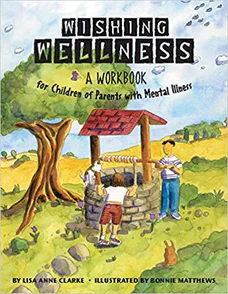Wishing Wellness
A Workbook for Children of Parents with Mental Illness
Written by Lisa Anne Clarke
Illustrated by Bonnie Matthews
128 pages
•
Published 2006 (Magination Press)

Recommended Age Range: 2nd grade through 5th grade.
Publisher's Summary:
Wishing Wellness is a workbook for the child whose mother or father is suffering from a serious mental illness. Packed with information, interactive questions, and fun activities, it’s an ideal tool for children and their therapists or other professional mental health workers, covering: how the brain works; causes, symptoms, and treatment of mental illness; feelings and what to do with them; good relationships with parents; talking to friends and others; roles, rights, and responsibilities in the family; coping with prejudice; building a circle of support.

Dr. Annie's Takeaways
Recommended for: Children with a parent or caregiver who is experiencing psychosis (i.e., hallucinations and/or delusions) or is otherwise behaving very unusually. Parent diagnoses of Bipolar I Disorder, Schizophrenia, Schizoaffective Disorder, Delusional Disorder, and Major Depressive Disorder with psychotic features are all appropriate. This book is best completed in small doses with a therapist or a caregiver who is not symptomatic.
Would a child like it? It’s a bit dense, and pulls for exploration of difficult experiences and feelings. But the information is good and developmentally appropriate, and it is likely reassuring to a child whose parent is experiencing psychosis.
Tone: matter-of-fact, informative
Story Quality: This workbook uses child-friendly language to help a child to understand what severe mental illness is, how it impacts their parent, and how they can cope and stay safe. There is a nice section on coping with prejudice that others might feel towards the parent with mental illness, as well as some sections on general coping strategies such as taking deep breaths and practicing self-affirmations. There are activities interspersed throughout the workbook which prompt children to draw, write, and complete puzzles (e.g., “When my parent is acting unusual, I feel:_______”). The workbook is very long, and the text isn’t particularly engaging. But it’s clear enough, and the first few chapters that most specifically address the experience of having a parent with psychosis are especially valuable.
Illustrations: Cute black-and-white illustrations interspersed throughout the text.
Representation: There is one mention at the beginning of the book that asks a child to write their mom’s name and their dad’s name and then draw a picture of their parents. The rest of the book refers to “mom or dad.” Many different children are portrayed in the illustrations throughout the text (i.e., children with different skin tones, hair, and genders).
Psychological Practices: This book provides psychoeducation
that best addresses the experience of a child whose parent has psychosis (i.e., hallucinations and/or delusions) and/or has symptoms that cause them to act in very unusual ways. It gives a brief explanation of how the brain’s chemistry can cause a person’s “normal brain activities like thinking and imagining” to not work properly, and it prompts a child, through different activities, to share what they’ve noticed about how their parent behaves when they are struggling with their mental health. There are sections that encourage a child to think through safety concerns and who they can contact if they are worried or unsure. It shares about what it might be like to visit a parent in the hospital, and about how medication
can be helpful for some people but others don’t always want to take it. It reassures children that their parent’s mental health challenges are not ever a child’s fault, no matter what anyone says. The last sections of the book go into protective coping strategies (e.g., self-affirmations) and plans to bolster a child’s social support.
Concerns: The book uses the terms “mental illness” and “mentally ill.” For some people, these terms help to clarify that their symptoms are an illness rather than a reflection of their character or personality. For others, these terms feel derogatory or stigmatizing. There’s not a right or wrong answer here, but it’s worth noting that the book doesn’t shy away from referring to parents as being ill.
